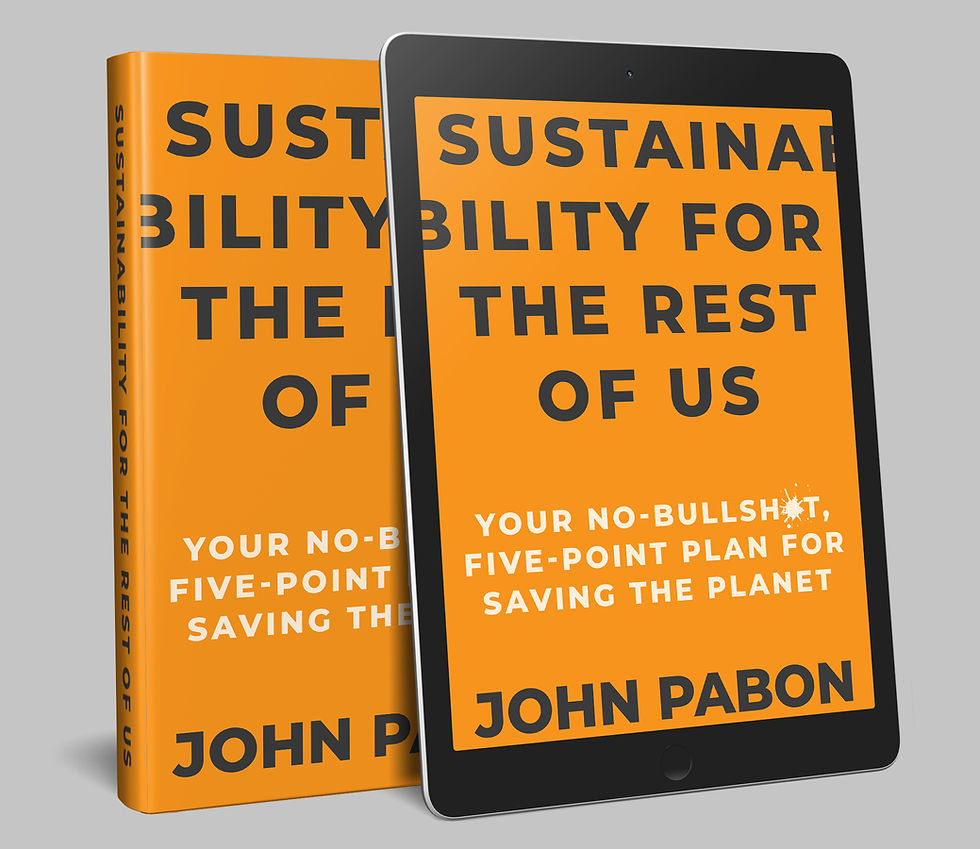The 10 Greenwashing Commandments
- John Pabon

- Jan 1, 2024
- 3 min read

For too long some of the individuals, governments, and companies claiming to do the most to save the planet are nowhere near walking their talk. They’ve put up beautiful window dressing to distract from all the horrific stuff happening inside their houses. These actors have treated all of us like fools. In so doing, they’re holding back the progress they claim to support. All the while we’ve fallen into their trap by believing their lies and refusing to question their sincerity.
That's because they've become experts at greenwashing, which Investopedia defines as “...conveying a false impression that a company or its products are more environmentally sound than they really are.” It’s a play on the term whitewashing, which is used when someone, or some company, is trying to put a good spin on something bad. The same holds for greenwashing. Companies engaging in greenwashing are just trying to put a good spin on their bad actions. Perhaps it’s on the environmental sustainability of a product or service. Maybe it goes as far as to position a company as eco-friendly when, in reality, they aren’t. No matter how it’s used, greenwashing at its core is a lie.
Greenwashing comes in many forms. You see it on packaging, in corporate reports, and of course on advertising. But, if you really want to make sure the money you spend is going to something worthwhile, watch out for some of what I call the Ten Greenwashing Commandments.
Thou shalt not use fluffy language
What, exactly, is a package or advertisement saying? Are they using catch-all terms like "eco-friendly" without providing information to back that up?
Thou shalt not marry green products with a dirty company
Just because one product might be eco-friendly doesn't necessarily mean the whole company is. Consider, for example, efficient light bulbs made in a factory that pollutes rivers.
Thou shalt not use suggestive pictures
Stay away from products using images that indicate an (unjustified) green impression (e.g., flowers blooming from exhaust pipes). Not only are they tacky, but usually try to hide the truth.
Thou shalt not make irrelevant claims
Much like marrying green products with a dirty company, claims will sometimes emphasize one tiny green attribute when everything else is un-green.
Thou shalt covet only the best
Companies will often compare their green performance against others in their industry. But, what if the whole industry is bad and they are just the best of the bunch? Performance should be based on only the best, period.
Thou shalt not green a dangerous product
“Eco-friendly” cigarettes, anyone? “Greening” a dangerous product doesn't make it safe.
Thou shalt not have imaginary friends
Be careful of endorsements, especially in advertising. A label that looks like a third-party endorsement might actually be made up, or it might belong to the company itself. Talk about a conflict of interest.
Thou shalt not use Latin
Huh? What in the world does that mean? Stay away from companies that use lots of jargon and information that only a scientist could check or understand.
Thou shalt provide proof
Sure, what they're saying might be right. But, we want to see the proof just to be sure.
Thou shalt not lie
Greenwashing, in and of itself, is just lying to consumers. If they'd just follow this one commandment, there would be no greenwashing in this world.
For the more visual of you, I've even put together a handy one-pager you can print out and take with you to the shops.

Want to stop greenwashing in its tracks? Buy "Sustainability for the Rest of Us: Your No-Bullshit, Five-Point Plan for Saving the Planet," out now at these retailers.




Comments